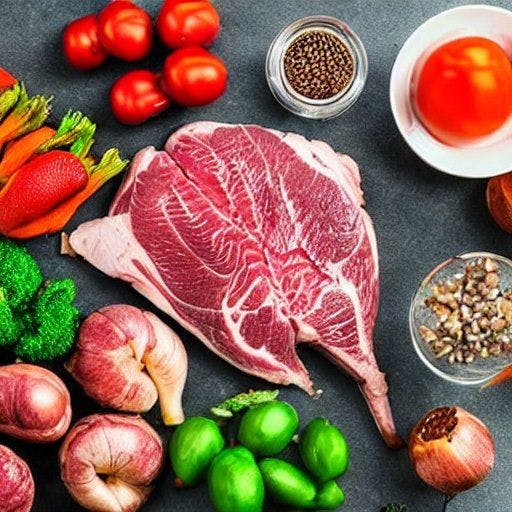
The Carnivore Diet is a strict, animal-based dietary pattern that eliminates all plant-based foods, including fruits, vegetables, legumes, grains, and nuts. This diet is based on the premise that humans have evolved to thrive on a diet rich in animal products, and that plant-based foods are not essential for optimal health.
Proponents of this diet claim that it can lead to improved energy levels, weight loss, mental clarity, and a reduction in chronic health conditions such as diabetes, heart disease, and autoimmune disorders. The Carnivore Diet is a highly controversial eating pattern, with many health professionals and experts expressing concerns about its long-term safety and sustainability.
Despite this, it has gained popularity in recent years among those seeking a simple and extreme approach to weight loss and improved health.

Meal Planning
Meal planning is an essential part of sticking to any diet, and the carnivore diet is no exception. When meal planning for the carnivore diet, it is important to consider the following:
- Quality of meats: It is important to source high-quality meats from grass-fed and grass-finished animals. These meats are more nutrient-dense and contain less harmful chemicals and toxins.
- Variety of meats: Eating a variety of meats can help to ensure that you are getting all of the essential nutrients your body needs. This includes red meats, poultry, fish, and organ meats.
- Incorporating healthy fats: Healthy fats, such as those found in avocado, coconut oil, and grass-fed butter, are essential for overall health and can help to keep you feeling full and satisfied.

Sourcing Quality Meats
When it comes to the carnivore diet, the quality of the meats you eat is essential. It is important to source high-quality meats from grass-fed and grass-finished animals. These meats are more nutrient-dense and contain less harmful chemicals and toxins. Some ways to source quality meats include:
- Buying from local farmers or ranchers: This can help to ensure that the meats you are eating are of high-quality and ethically raised.
- Shopping at farmer's markets or specialty butcher shops: These places often carry a wider variety of high-quality meats.
- Joining a meat CSA (community-supported agriculture) or ordering online from a reputable source.

Incorporating Healthy Fats
To incorporate healthy fats into a carnivore diet, individuals can focus on consuming grass-fed beef, organic chicken, wild-caught fish, and other high-quality animal products. These foods are rich in omega-3 fatty acids, which have been shown to have numerous health benefits, including reducing inflammation, improving heart health, and supporting brain function.
In addition, individuals following a carnivore diet can also incorporate healthy fats such as avocado, coconut oil, and olive oil into their meals. These healthy fats can be used to cook meat or as a dressing for salads.
It is important to note that incorporating healthy fats into a carnivore diet does not make this eating pattern a balanced or sustainable one. The elimination of plant-based foods may result in nutrient deficiencies over time and increase the risk of chronic diseases. It is always recommended to consult with a healthcare professional before making significant changes to one's diet.

Adding avocado or coconut oil to your meals
Adding avocado or coconut oil to your meals on a carnivore diet can provide some benefits, as both avocado and coconut oil are rich in healthy monounsaturated and polyunsaturated fats. However, it is important to note that the carnivore diet is based on a high consumption of animal products, so incorporating other foods into your meals may go against the principles of the diet.
Avocado is a good source of monounsaturated fats, fiber, and various vitamins and minerals, making it a nutritious addition to a carnivore diet. Adding avocado to a carnivore meal, such as a steak, can increase its nutrient content and help to make the meal more satisfying.
Coconut oil is also a healthy fat that is rich in medium-chain triglycerides, which have been shown to improve weight loss, cognitive function, and heart health. Adding coconut oil to a carnivore meal can increase its calorie and fat content, which may be beneficial for those looking to add more calories to their diet.
It is important to remember that adding avocado or coconut oil to a carnivore diet should be done in moderation, as consuming too much of these fats can contribute to weight gain and other health issues.
Conclusion
The Carnivore Diet is a highly restrictive diet that emphasizes the consumption of animal products and eliminates all plant-based foods. Proponents of this diet argue that it provides numerous health benefits, including weight loss, improved digestion, and increased energy levels. However, this diet also raises concerns about its sustainability, as it eliminates important sources of fiber, vitamins, and minerals that are essential for optimal health.
While some people may see positive results from following the Carnivore Diet, it is not recommended for the majority of people, as it goes against long-established nutritional guidelines. It is important to seek the advice of a qualified healthcare professional before making any significant changes to one's diet, especially one as extreme as the Carnivore Diet.
